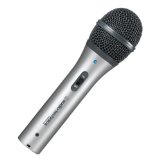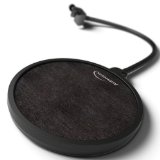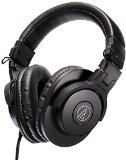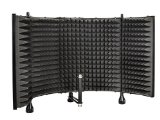 Your acting career doesn’t necessarily have to begin in front of the camera or on stage. Many aspiring performers choose voice acting jobs instead of film acting, or pursue it on the side.
Your acting career doesn’t necessarily have to begin in front of the camera or on stage. Many aspiring performers choose voice acting jobs instead of film acting, or pursue it on the side.
I’ve started my journey with stage, then moved onto film. Eventually, I began looking for voice over jobs myself, and it opened more doors for me, both in terms of connections and finances.
With that being said, becoming a voice actor isn’t something you can actually do “on the side,” really. That is if you want to make good money from voice overs and succeed as an artist in this field.
This career choice will require dedication.
Similarly to screen acting, your focus will be to continuously audition, produce good work and then hope to get signed by one of top talent agencies in Los Angeles. Once that happens, you’ll be able to catch your breath.
So after many months of researching this career and trying to get voice acting jobs myself, I feel confident that I can provide you with some great tips on how to become a voice actor in Los Angeles, or any other city for that matter.
In this article, I will walk you through the following topics:
- What is a voice over?
- How to get into voice acting?
- Where to find voice acting jobs?
- How do voice acting casting calls work?
- What voice over home studio equipment you’ll need?
If by the end of this article it’s still unclear to you where to find voice acting jobs, what voice acting casting calls are and how to get into voice acting, leave your questions in the comments and I’ll update it with more details.
So Where Do You Look for Voice Acting Casting Calls and Book Voice Acting Job?
Let’s begin with a quick introduction on what voice over is and what do voice actors do.
What is a Voice Over?
 I assume that if you’re looking for voice acting jobs, you’re already familiar with this career. In case you need more details, let me briefly explain what is a voice over and what this profession entails.
I assume that if you’re looking for voice acting jobs, you’re already familiar with this career. In case you need more details, let me briefly explain what is a voice over and what this profession entails.
A voice over (or voice-over, or voiceover) is a production technique, or at least that’s how Wikipedia describes it. This technique is used in filmmaking, radio, TV, and some other mediums.
All voice overs are pretty much the same thing: an actor is recorded as he reads off-camera from a given script. That dialogue or monologue is later added to film, animation, documentary, video game, or other piece of work.
Regardless of what many believe, voice over work is not easy. There’s a reason why it’s a big market where good money can be made. Today, finding voice acting jobs has become very difficult. It’s a competitive niche for voice performers.
However, some voice actors have said that doing voice over work is the easiest job one could have:
“It really depends, but, generally speaking, just because of the mechanics of it, voice-over is easier because there is no hair, no makeup, no wardrobe, no fittings, no line memorizing. You don’t have to me woken up in Russia at 6 in the morning and go film a scene. It’s just easier on the body, the family life to do voice-overs.” – Kathy Najimy
There’s definitely a lot of truth to that, but don’t be misled. If you’re just starting and you want to get into voice acting, it’s going to take some voice training and consistency.
How to Get Into Voice Acting?
 Becoming a voice actor is similar to pursuing a career as a film, TV or stage actor (or most other performing arts careers, really). You start with nothing, train yourself and look for voice acting jobs you can book.
Becoming a voice actor is similar to pursuing a career as a film, TV or stage actor (or most other performing arts careers, really). You start with nothing, train yourself and look for voice acting jobs you can book.
You’ll need just two things:
- Your voice demo reel;
- Membership on a casting website.
It’s really that simple, but let’s break it down a little.
Here’s the secret: the easiest way to get into voice acting is to actually START.
Begin with anything. Just put together a simple voice over reel with whatever you have and start applying.
Stop preparing yourself, stop trying to find the best way, stop figuring things out. Simply apply for voice jobs (see below where) and see what happens.
It’s true, you will suck at this in the beginning. You won’t book most of the stuff you apply for. And you will most likely fail, many times. But failure is the best experience you can have, and that’s how you learn quickest.
You cannot learn to swim in you’re afraid to dip your toes into the water.
With that out of the way, there are things you can (and should) do to improve your chances of booking voice acting jobs. This is what you do on the side as you continue to audition and look through voice acting casting calls every day:
- Get some voice over training under your belt
- Put together a voice over demo reel
- Market yourself and your voice within the industry
- Start networking and making connections
- Get an agent
I will dig deeper into all five of these points in a future article where I’ll be able to expand more and explain each point in greater detail. But I’m sure that without any explanations you already understand what each one of those steps entails.
Briefly, here’s how this process works.
You need training to keep getting better as a voice artist. Voice over is an art form, and just like any craft, you need to hone it to be great at it.
Having a good voice over demo reel will help you book more voice acting jobs. But don’t obsess about making it perfect at first. When you’re just starting out, put any kind of demo together if you don’t have the funds to spend on professional services.
Once you’ve got some voice over training and a somewhat decent demo reel, start marketing yourself. Don’t just look for voice acting casting calls, but go out of your way to make sure people know about your talent.
On top of marketing, getting out there to network is arguably the quickest way to get BIG productions to hire your voice. Connections are everything in this industry.
Finally, getting an agent doesn’t have to be your last step. You can start looking for one at any point in your career, but it’s never easy to get signed. Most voice actors have the best chance of getting an agent after they have a body of work, a name to themselves and solid training.
That’s pretty much it when it comes to becoming a voice actor. Sticking to this plan and staying consistent is what will get you your big break.
Need a full list of agents? 150 Top Talent Agencies in Los Angeles (2017)
Where to Find Voice Acting Jobs Online?
 Now, the big moment we’ve all been waiting for. Where does one find voice acting jobs and how to actually book them?
Now, the big moment we’ve all been waiting for. Where does one find voice acting jobs and how to actually book them?
Internet.
Surprised? Probably not. It’s likely you’ve already Googled something like “voice acting casting calls” or “voice over jobs Los Angeles.” You know those websites that come up? Some of them are legit, and that’s where you begin your search for voice over gigs.
Similarly to finding TV or film acting auditions, a few of those websites also publish voice acting casting calls.
Here’s a list of legitimate places to find voice over jobs online:
The first three are voice-over work only sites, meaning that all you will get are voice acting casting calls. The last two are mostly for film, TV and theater work, but they also post castings for voice over work.
All of these websites have free and paid options. Naturally, a free account will have limits, so if you’re serious about becoming a voice actor, then you’ll need to invest a little in your career.
I’ll quickly introduce you to the first three most popular voice over casting calls websites. Please note that I’m not an affiliate for any of these three sites, and my opinion of them is completely impartial.
Voices.com Casting Calls
Voices.com is the biggest site for voice over work. It’s slightly more expensive, but they offer an additional paid monthly option which is good if you just want to try it out.
Here’s their three membership plans you can choose from:

If you want to see all the options you get with each account, simply register on their site (for free) and you’ll be taken to Voice.com pricing plans.
Voice123.com Casting Calls
Voice123.com is slightly less popular but a great place to look for voice acting jobs nonetheless. They’re in the middle between the most expensive and the cheapest way to start.
They don’t have a monthly plan, but here’s what they offer:

Again, if you want to explore what this account will provide you with, then register for free at Voice123.com site and see what they have.
VoiceBunny.com Casting Calls
VoiceBunny.com is still a growing websites that continues to post legit voice acting casting calls. They’re the cheapest out of these three, so if you’re looking to test this out for the least amount of money, this may be a good place to start.
They also only have two plans, free and paid, and here’s what you get:

I advise you to register on VoiceBunny.com as well as on the other two sites (for free, of course) and then compare listings, options and whatever else they offer to see what fits you best.
Which one of these is best in my opinion?
It depends how much you can invest.
Aspiring voice over actors that are serious about becoming a voice actor quick and be professionals should go all in, in my opinion. That’s what I did. If that’s you, then try Voices.com for a full membership.
But if your funds are limited, then it’s up to you what works best. Even then, it seems like the cheaper membership of Voices.com could work better, but do your research.
Finally, there is another way to find voice acting work, and that’s freelancing.
Doing freelance voice over acting jobs
There are a few alternative ways voice over actors get jobs.
Registering with the above mentioned websites should be any voice over artist’s first priority, but doing something on the side to get more experience, earn some extra cash and boost your career is not a bad idea as well.
The two most well-known freelancer website for voice overs are these:
I’m not going to get into these right now, but I will in the future if you want me to. I suggest you to go to these sites and click around; most of the stuff is self-explanatory.
In the most basic terms…
UpWork is the world’s largest online freelancing job platform. People offer all types of services there, including voice over work.
Fiverr is huge and very similar as well, but they have a different system: services cost $5 each (but you can provide “extra gigs” for more money).
The way it works is simple: client registers on the site, posts a job (or finds your service in search) and you go from there. Everything is legitimate and you shouldn’t worry about being scammed.
How else to improve chances of booking voice over work?
If you Google around, you can find a few other suggestions on where to find voice acting jobs, and how to book your first gigs.
Since I’ve been at this for a while, I already knew most of the methods, but I did my research for this article anyway. Fortunately for both me and you, I found some interesting tips that I didn’t think of before myself.
Unconventional methods. For example, this article from Edge Studio provides a thorough list of ways you can find more work as a voice actor.
Most of the methods they list are somewhat unconventional, and are unlikely to get you a lot (if any) work. However, it never hurts to try.
Aspiring actors who have some extra time on their hands must definitely try all possible ways to get out there and find more voice acting casting calls, and book more gigs – whatever they may. I know I’ll give some of these a shot.
Going mobile. During my search for more tips, I’ve also stumbled upon this piece from LA Times. It provides some great insight into this profession.
In the article, the author interviews a few voice artists who share their “secret” methods for finding voice over jobs. What’s the method? Using mobile phone apps.
When I was reading through it, I realized that I have never done this! And it seems like it should be one of the first go-to places for voice over work.
What are those voice over apps? Unfortunately, there’s just one so far for booking voice acting casting calls:
However, there are some really cool mobile apps for voice over artists that you can use outside of work to practice or warm-up your voice.
Here are a few that I’ve found and that would be useful for voice over actors:
- SAY-U App [Android | iOS] – practice voice over work by dubbing characters;
- Vocal Warm Up [Android | iOS]
- Voice Recorder [Android | iOS]
- Audition Editing [Android | iOS]
Now back to the LA Times article.
Voice actors who are interviewed (and who are now making millions from providing their voices to video games, by the way), also mentioned the importance of having a home studio equipment set up.
“The ability to create a home studio has put voice-over work within reach of more than just professional actors, opening up the industry to anyone who thinks they can make money off their vocal cords.”
This is a very important point to cover, since you will need to know the basics of a home voice over studio and how to set it up (for cheap). I’ll talk more on this later in this post.
How to Book Your First Voice Acting Casting Calls
 Finding voice over jobs on the above sites is very simple. You sign up and then browse their job listings, otherwise known as voice acting casting calls.
Finding voice over jobs on the above sites is very simple. You sign up and then browse their job listings, otherwise known as voice acting casting calls.
If you’ve applied for any type of artistic work online before, then this is exactly the same. But if you’re completely new to the performing arts industry, then I’ll explain to you the casting call process in detail.
Here are the steps you take to book voice over jobs online:
- Sign up on the website (paid or free)
- Go to the voice over casting calls list page
- Filter the list by location (choose your city)
- Start clicking through the most recent jobs
- Read the description, and if all fits, click “Apply”
- Upon applying, you’ll send your resume and demo reel
- Done. Wait for them to respond if they pick you
This is a standard practice for booking voice acting jobs, and it’s pretty straightforward.
Note that you’ll be doing this daily – browsing through casting calls, picking work that you like, applying – so you’ll get quite good, fast. I do this first thing in the morning for all of my acting work, both film and voice overs.
What happens after you send in the application is self-explanatory: casting directors (CDs) will listen to your demo, and if your voice fits, they will get back to you with further details. Usually, this is done on the same platform you used to apply for the voice over work.
If they don’t pick you, most of the time nobody’s going to get back to you. So do not waste your time sitting and waiting, it’s not worth it.
Just like with auditions, once you apply for your voice acting casting calls – move on. Don’t dwell on anything, there’s no time for this.
So let’s say they do like your voice over demo and they’re interested in you.
One of two scenarios will take place:
- They’ll ask you to come into the studio for audition, or
- Send you a script for you to do a voice over and send it back to them.
The second option is the most common for booking voice acting jobs. The first one is likely only for huge productions, and you won’t find those on the regular voice over casting call websites.
Therefore, in order to book your first (or 100th) voice over job, you need to be prepared.
Aspiring voice over actors are expected to record their voice auditions at home. The logic is that there’s no reason to waste anybody’s time with studio rentals and commute.
For this reason alone, all voice over artists always have at least some very basic voice over home studio equipment set up at home to be able to record their voice over auditions.
If you don’t have a home setup, it’s unlikely you’ll be able to book any voice over work.
While you don’t have to spend as much money on all types of acting tools that film actors have to, you do need your own small home studio equipment, which will be the biggest investment in your voice over career.
With that being said, let’s talk what type of voice over home studio equipment you should get to start booking voice acting jobs, and how much is that going to cost you.
All the below items is what I personally used. I researched a lot before I bought my stuff, mostly looking for the best quality products for the cheapest price. I think I did pretty well in terms of finding cost-effective equipment, so let’s take a look.
Voice Over Home Studio Equipment You’ll Need
 This is arguably the biggest expense you’ll have if you want to become a voice actor. Film and TV actors don’t need to do this, but they have tons of their own expenses, so it’s all the same in the end.
This is arguably the biggest expense you’ll have if you want to become a voice actor. Film and TV actors don’t need to do this, but they have tons of their own expenses, so it’s all the same in the end.
Do you really need to have your own voice over home studio equipment, or is that just something to consider?
Yes, you really need it. At least some of the most basic stuff. Why? Because you’ll have to record most of the auditions yourself, and how are you going to do that without the equipment?
Why can’t you record it on your phone? Because even though phone cameras are now good enough to shoot a movie, phone voice records do not provide sufficient quality for the casting director to even consider you.
Basically, if you send anything that’s not up to quality in sound, it will look unprofessional. No matter how good of a voice actor you are, it’s unlikely you’ll be considered.
Here’s what you’ll need the most:
- Basic voice over microphone
- Pop-filter/windscreen
- Basic but decent headphones
- Simple sound booth setup
- Editing software
And this is what you can wait on but need to get as soon as you can:
- Good quality microphone
- Mic stand
- Pre-amp
- Good quality headphones
- Proper sound booth
- Mixing board
Personally, I only got myself the most basic voice over home studio equipment setup. I’ve done a lot of research to find the most cost-effective options, and I’ll share those with you below.
Transparency: Please note that product links below are affiliate links, meaning that you can help me out a little (at no cost to you) when you buy using them. If you don’t want to do that, then simply copy the name of the equipment and Google it.
Voice over microphone
 Obviously, your microphone is what records your voice so you’ll need to spend the most you can afford on this piece of equipment. Everything else can be cheaper.
Obviously, your microphone is what records your voice so you’ll need to spend the most you can afford on this piece of equipment. Everything else can be cheaper.
However, I found a really great microphone for a very affordable price which I’m not in a rush to exchange for something better. It’s called Audio-Technica ATR2100-USB Dynamic Microphone.
I’ve seen a lot of voice over artists and podcasts recommend this mic as the best budget option, too. Even Tim Ferriss is using it.
For what this microphone costs, you can’t beat this quality.
Pop-filter/windscreen
 A pop-filter is what you see used in most home equipment studios as well as professional studios. It serves as an anti-pop protection shield or filter for a microphone to produce better quality sound.
A pop-filter is what you see used in most home equipment studios as well as professional studios. It serves as an anti-pop protection shield or filter for a microphone to produce better quality sound.
Basically, it removes (or almost removes, depending on your skills and the quality of mic and pop-filter) the popping sound. That “popping” sound is common, and it’s created due to air moving to the microphone when you record your voice.
Pop-filters can be expensive, but there’s no need for you to get anything above $20. I first got a very cheap one for $7, which broke after the first day. Second one I bought as the Auphonix Pop Filter for just under $20 and it’s perfect.
Studio headphones
 There’s no need to go super fancy with headphones, in my opinion. I’ve seen headsets that cost upwards of $1000+ and some voice over artists do you use those, but unless you’re already making big bucks, I’d say don’t go anywhere above $100.
There’s no need to go super fancy with headphones, in my opinion. I’ve seen headsets that cost upwards of $1000+ and some voice over artists do you use those, but unless you’re already making big bucks, I’d say don’t go anywhere above $100.
A good headset is necessary, however. You need to isolate outside noise and clearly hear your recordings, and you cannot let your mic pick up any sounds from speakers (duh). Your iPhone headphones will not help you here. I’ve tried.
I was happy with my Audio-Technica mic, so I decided to go with the same brand. After a lot of research, I saw that many others also recommend these: Audio-Technica ATH-M30x Studio Headphones.
Sound booth/soundproofing
 Another important part to your basic voice over home studio equipment setup is soundproofing the area and isolating any type of outside noise. This is absolutely vital to produce a quality recording.
Another important part to your basic voice over home studio equipment setup is soundproofing the area and isolating any type of outside noise. This is absolutely vital to produce a quality recording.
If your mic ups the noise your fridge makes, or how neighbor mowing grass, or even some ambient noise in the room – the recording is no good. Having a proper sound both is the best option, but it’s costly so I wouldn’t recommend it at first.
Instead, what you can do is go the budget way like I did, and get yourself a small soundproofing setup.
Basically, I bought an isolation shield (Monoprice Pro Audio Shield is great) to put around my microphone. Then, I got some cheap soundproofing foam, and put it up on the walls. You don’t need to cover all the walls, however.
I have to say, I’m not even consider building a sound booth, because this setup works perfectly well and isolates all the noise. And I’m not living the quietest neighborhood.
Editing software
To become successful at booking voice acting jobs, you also need to edit them accordingly. It’s not difficult, and proper software helps out a lot.
There’s a lot of voice over editing software out there that you can purchase. If you know what you’re doing, or you have time to learn all the fancy techniques for editing your voice overs, then it may be a good option.
For me, I just went with free editing software and didn’t pay a dime for it. It works perfectly well and I have no reason to buy anything at the moment.
If you want a free option, then you can’t beat Audacity in this area. It does absolutely everything you need it to do, it’s very simple to get a hang of and there are no unnecessary features that would confuse you.
So that’s pretty much it in terms of voice over home studio equipment.
Like I said, if you’re starting to make money with your voice over work, then consider investing into better equipment, more websites to find better voice acting jobs and further progress in this career.
Take Home Message
 Let’s summarize. Voice acting is a great career choice, but also the one that will require your full dedication if you want to become a regularly working voice actor.
Let’s summarize. Voice acting is a great career choice, but also the one that will require your full dedication if you want to become a regularly working voice actor.
Being a voice artist can pay good money after you break into the industry. Voice acting jobs are easy to find but not easy to book when you’re just starting out.
This career choice will require initial investment in the form of setting up your own home studio equipment for recording voice over auditions.
I myself am just in the beginning stages and booking voice over gigs here and there, but I am yet to get any major studio voice over work. Once this part of my career picks up, I will update you with more advice on how and where to move further, and share my own experience.
If you have any questions about finding voice acting jobs, how to get into voice over acting or setting up your voice over home studio equipment, leave your questions in the comments below.

